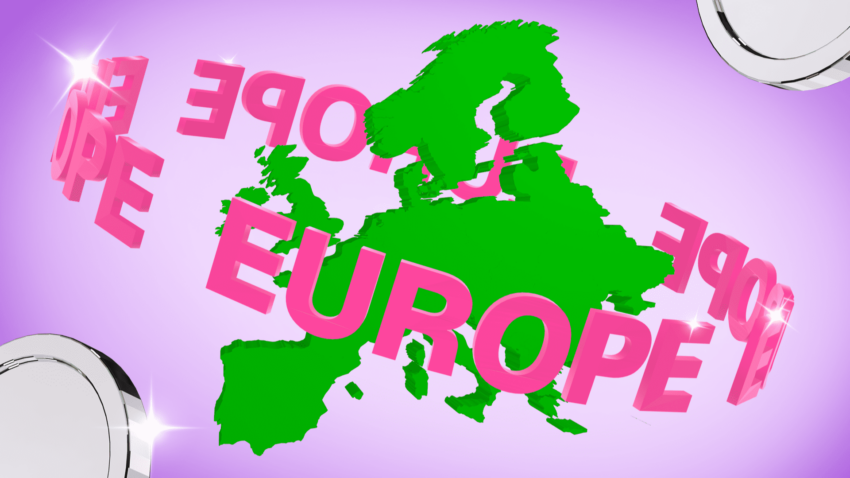BeInCrypto’s comprehensive Europe Crypto Roundup covers the latest news and trends shaping the continent’s crypto landscape. With reporters across key markets like Germany, France, and the UK, we provide in-depth insights into regulatory environment, adoption rates, and major industry events.
This week’s roundup highlights Bank Pekao’s partnership with Aleph Zero, Boerse Stuttgart Group’s blockchain-based securities transaction test with the ECB, and other top stories.
Poland’s Bank Pekao Partners with Aleph Zero to Tokenize Historic Artworks
Poland’s second-largest bank, Pekao S.A., has partnered with the Aleph Zero to tokenize some of the country’s most renowned artworks. In collaboration with Degen House, the trio has launched Archiv3, an initiative aimed at safeguarding Poland’s cultural heritage. The Arctic World Archive (AWA), often called the “Doomsday Library,” will securely store digital reproductions of the artworks.
Archiv3 marks an important step, making Bank Pekao the first universal bank to tokenize historical art for preservation. This follows the earlier “Unique” project and highlights its commitment to blending blockchain with traditional banking. Bank Pekao cited Aleph Zero’s speed, security, and eco-friendly approach as key reasons for choosing the blockchain.
“We have chosen Aleph Zero for their privacy-focused, top-class technology combined with sound experience in cooperation with large institutions. Minimal carbon footprint as well as low storage costs were also important factors in our decision-making process. Tokenization of art requires modern and flexible technology, unforced creativity and some out-of-the-box thinking; these features we were happy to find in co-operation with Aleph Zero,” Michał Walęczak, Director of the Private Banking Strategy and Development Department at Bank Pekao S.A., said.
Read more: What is Tokenization on Blockchain?
The project focuses on digitizing masterpieces from famous Polish artists like Jan Matejko, Stanisław Wyspiański, and Wojciech Kossak. High-grade 3D scanning technology captured every detail of the original artworks. These digital replicas were then minted as NFTs on Aleph Zero’s blockchain, ensuring their safekeeping for up to 1,000 years.
Robinhood Launches Crypto Transfers in Europe
Robinhood has launched crypto transfer services in Europe, enabling customers to move cryptocurrencies in and out of its app. Customers in the European Union can now deposit and withdraw over 20 digital currencies, including BTC, ETH, SOL, and USDC, via Robinhood’s platform.
This development comes barely a year after Robinhood Crypto forayed into the EU market. The venture allowed customers to buy and sell cryptocurrencies. However, they could not move them away from the platform to another third party or their own self-custodial wallet. The latest development changes that.
Robinhood’s move to bring crypto transfers to Europe acknowledges the region’s potential to become an attractive market for digital currencies. Its general manager and vice president, Johann Kerbrat, cited crypto-friendly regulations adopted in Europe’s 27-member bloc. In his opinion, things could be better once Markets in Crypto-Assets (MiCA) are in full effect.
Read more: What Is Markets in Crypto-Assets (MiCA)?
This regulatory clarity has allowed companies like Circle to obtain an Electronic Money Institution (EMI) license, enabling them to offer dollar- and euro-pegged crypto tokens under the MiCA framework.
Amid this environment, there was speculation that Robinhood was exploring stablecoin launches alongside Revolut, but the retail investing platform has denied these claims. The firm put out the speculation, citing no “immediate plans” to launch its own stablecoin.”
Boerse Stuttgart Group and ECB Test Blockchain-Based Securities for Faster Settlement
Boerse Stuttgart Group, Germany’s second-largest exchange, has completed a test of blockchain-based securities transactions in collaboration with the European Central Bank (ECB). This pilot marks the first instance of settling exchange transactions with blockchain-based securities using central bank money.
The test, conducted as part of the ECB’s exploration into blockchain technology, involved six leading banks: Commerzbank, Deutsche Bank, DZ Bank, LBBW, Bankhaus Metzler, and V-Bank. Using Boerse Stuttgart’s blockchain-based settlement solution, the institutions executed various transactions with five tokenized securities, including bonds, shares, and funds.
“The tests showed that the settlement processes can be mapped automatically, step by step and directly between the trading participants – efficiently, securely and without counterparty risk,” the news release read.
Read more: Crypto vs. Banking: Which Is a Smarter Choice?
The pilot focused on achieving interoperability between blockchain systems and central bank money, drastically reducing settlement times from the usual two days to just a few minutes. The project evaluated a wide range of scenarios, simulating real-world market conditions to understand how blockchain could be integrated into existing financial infrastructures.
Additionally, Boerse Stuttgart’s crypto custody service, Euwax, contributed to the test, further supporting the ECB’s ongoing research into the viability of blockchain for capital market transactions. This pilot represents a significant step toward adopting blockchain for faster, more efficient financial settlements.
France Introduces JONUM Regulation for Play-to-Earn Games
France, a prominent hub for crypto regulation, has introduced new rules for the growing play-to-earn gaming sector. Building on its existing frameworks, such as the PSAN license, the country has adopted JONUM (Games with Monetizable Digital Objects), a regulation aimed at clarifying the legal status of games that offer cryptocurrency rewards.
Enforced since May 2023, the JONUM regulation addresses the uncertainty around crypto-based rewards in games. The French National Gaming Authority (ANJ) will oversee these projects, with full implementation expected by the end of 2024. To qualify under JONUM, games must meet four criteria: provide an online service, offer rewards in NFTs or tokens convertible to cash, feature random game mechanics, and allow players to invest in game elements.
Unlike crypto platforms, play-to-earn games are not required to obtain a specific license but must declare their activity and comply with existing gambling, anti-money laundering, and cryptocurrency regulations. Non-compliance may result in fines or imprisonment.
Read more: Top 7 Telegram Tap-to-Earn Games to Play in 2024
Play-to-earn games offering cash or stablecoins will be treated as traditional gambling, while those with digital rewards that cannot be bought or sold will remain outside JONUM’s scope.
Disclaimer
In adherence to the Trust Project guidelines, BeInCrypto is committed to unbiased, transparent reporting. This news article aims to provide accurate, timely information. However, readers are advised to verify facts independently and consult with a professional before making any decisions based on this content. Please note that our Terms and Conditions, Privacy Policy, and Disclaimers have been updated.

